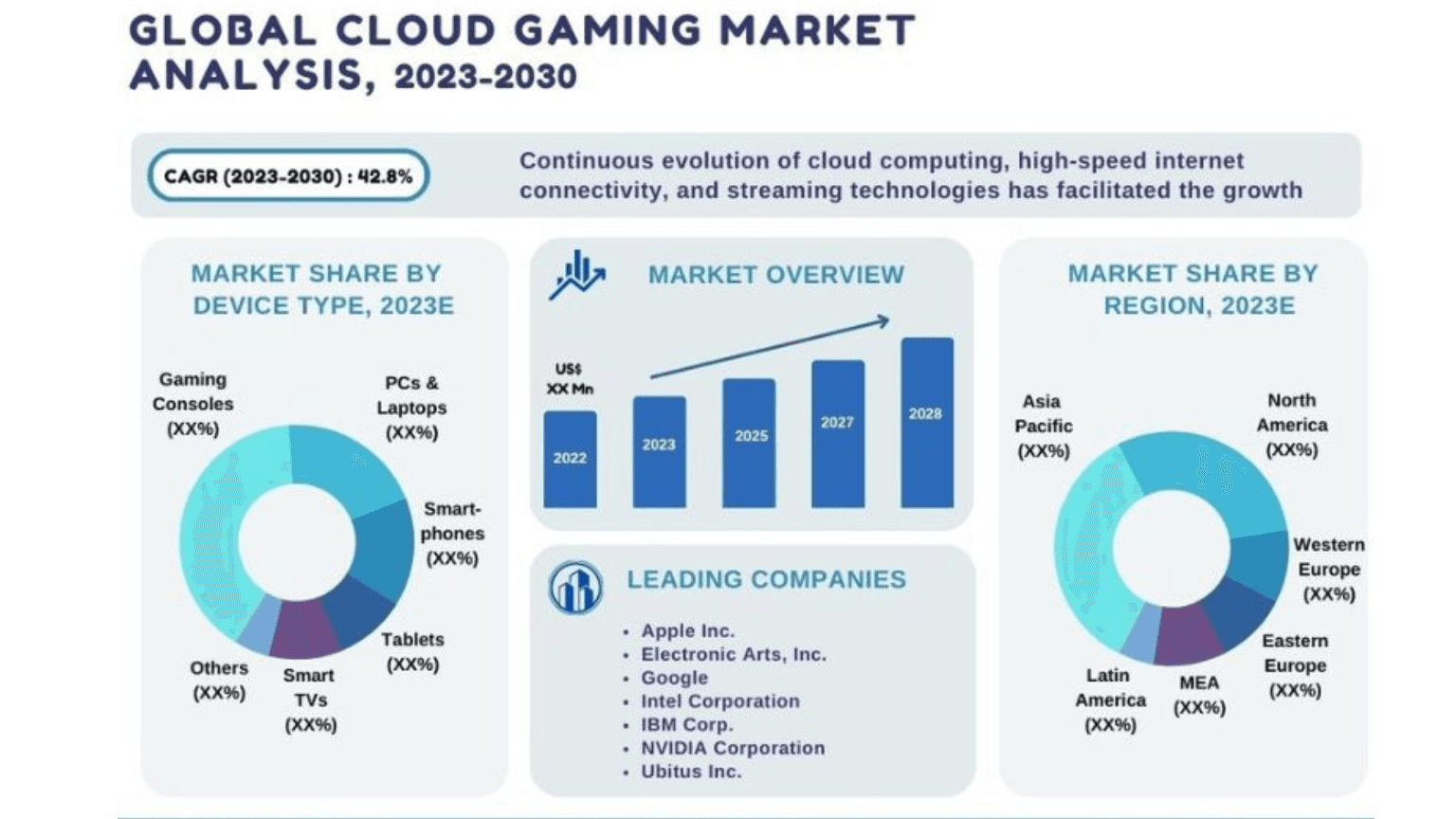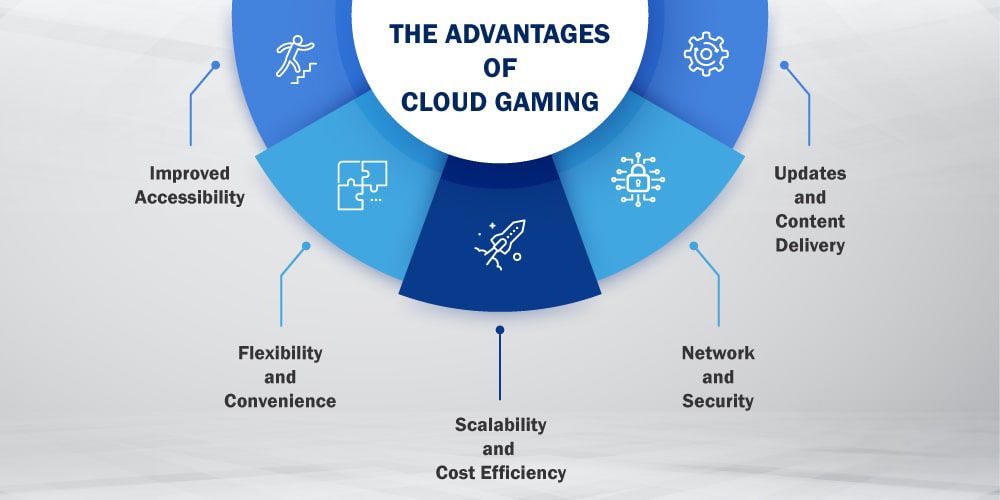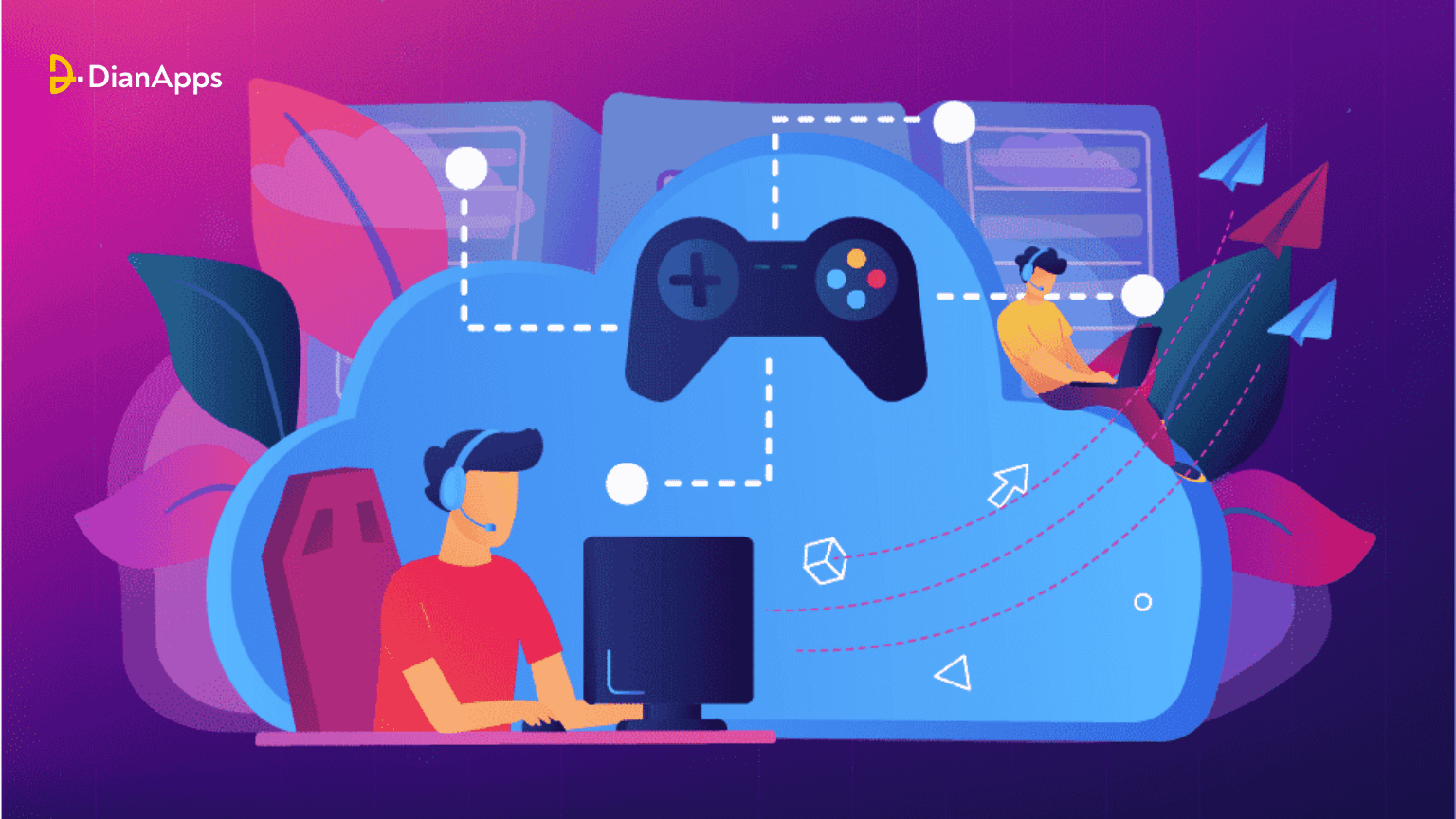Mobile gaming has been growing constantly, be it graphics, mechanics, or anything else. With continuous progress, these games require advanced computer specifications to run properly. It’s highly out of the blue to run a game built in 2023 on a PC you bought in the 2000s unless you’ve significantly upgraded your gaming kit. Cloud gaming has been gaining popularity in solving such challenges. This isn’t anything new, rather the concept of cloud gaming has been around for a decade or two but has become a strong competitor with time.
In situations where customers have been facing issues while securing ultra-modern gaming hardware like consoles, processors, and graphic cards, it is growing as an attractive alternative. Moreover, it is estimated to be a $6.91 billion industry in 2024.
As the internet infrastructure and streaming technology expand, cloud gaming promises to open doors to a new era of shared online play. Since this idea of cloud technology is all set to shape the future gaming industry, it is more important to know the concept in detail. So, our experts in mobile game app development services have curated a comprehensive guide for you to explore what cloud computing is and how it will change how we all experience games.
What is Cloud Gaming?
Cloud computing for gaming transforms the gaming experience by enabling users to play online games via remote servers in data centers. Unlike traditional gaming methods, users do not need to download or install games on their local devices; instead, games are streamed similar to how one streams videos on platforms like YouTube or Netflix. This streaming service necessitates a stable internet connection to deliver game data to the user’s device, with costs incurred for server space and internet bandwidth. Users typically pay a monthly subscription fee to access this advanced system provided by cloud gaming providers.
The Current State of Cloud Technology in Gaming
Cloud-backed mobile gaming has revolutionized the gaming industry, enabling users to stream high-end games on portable devices like laptops, tablets, and mobiles, leveraging fast network connectivity. This eliminates the need for frequent hardware upgrades of consoles, PCs, and laptops, fostering market growth.

Cloud gaming platforms offer numerous benefits for gamers, providing access to a wide range of high-quality titles without requiring expensive hardware. Developers, publishers, and platforms stand to gain increased profits and reach through greater monetization opportunities with cloud solutions.
The emergence of cloud gaming has diminished the necessity for hardware upgrades, allowing gamers worldwide to enjoy cloud games on their existing devices, including future devices with lower specs that can host cloud games.
What’s more, vendors have a significant opportunity to tap into the smartphone gaming market segment, catering to a substantial portion of the gaming audience that prefers playing PC and console games on mobile devices. With established platforms like Google Stadia and PlayStation targeting console and PC gamers, the rise of 5G services is expected to drive cloud gaming adoption on mobile devices further, leveraging mobile ubiquity and fast 5G connections to deliver AAA-quality gaming experiences to users globally.
How does cloud technology in gaming work?
Cloud gaming allows users to play high-end games on portable devices like laptops, tablets, and mobiles, without needing powerful hardware. This eliminates the hassle of regular upgrades. It’s expected to grow as more players engage in different games, boosted by fast network connections. Cloud gaming breaks down cost and platform barriers, benefiting gamers with access to quality titles and developers with increased profits. Companies with control over the gaming chain, from IP to infrastructure, benefit the most.
Gamers worldwide, even with low-spec devices, can play cloud games. Vendors see a big opportunity in attracting smartphone gamers who prefer PC and console games on mobile. Platforms like Google Stadia and PlayStation are already popular, targeting PC and console gamers. With 5G services launching, cloud gaming on mobile devices will rise, offering high-quality gaming on smartphones. Mobile network operators will also push for the global adoption of cloud gaming on mobiles.
Why is Cloud Gaming so Popular?
1. Hardware Flexibility
Cloud gaming eliminates the need for expensive PC or console upgrades. Basic laptops, mobile phones, or streaming boxes with controllers can suffice for gaming, making it accessible to a wider audience.
2. Platform Independence
Cloud gaming liberates games from platform limitations, enabling them to operate seamlessly across diverse operating systems such as Mac, Linux, and Android. This expands the accessibility of games beyond traditional PC and console platforms.
3. Smart TV Integration
Television manufacturers can integrate cloud gaming services into smart TVs, eliminating the need for additional gaming hardware. TVs equipped with the necessary software and controllers can offer gaming experiences without powerful hardware requirements.
4. Instant Access
Cloud gaming enables instant access to games without the need for large downloads. Games are already installed on remote servers, allowing players to start playing immediately and avoid lengthy download times and patch updates.
5. Seamless Spectating
Cloud services facilitate easy spectating of games, including professional gaming matches. Spectators can watch games without needing the game installed, as video streams can be duplicated for multiple users.
6. Enhanced Anti-Piracy Measures
With games running on remote servers, piracy becomes nearly impossible. This appeals to publishers as a form of DRM, ensuring better protection of game content.
Benefits of Cloud Technology in Gaming:

1. Game security
Cloud gaming systems offer secure storage of user data on protected servers, ensuring data integrity and confidentiality. Secure connections are used for data transmission, mitigating the risk of unauthorized access or hacking attempts. Furthermore, game data is stored in the cloud, eliminating the need for users to manually back up their data locally. This prioritization of user and game data security fosters trust among players, allowing them to enjoy their gaming experiences without concerns about privacy breaches.
2. No device limitation
Traditionally, non-mobile video games have been limited to specific consoles and PCs, restricting access to users with compatible devices. However, cloud gaming services are changing this landscape by enabling games to be played across various platforms, including Linux, iOS, Android, and Chrome OS. This platform independence expands accessibility, allowing a broader population to enjoy games previously exclusive to Windows devices.
3. Scalability and Cost Efficiency
Cloud computing empowers developers of any mobile game app development company with scalable and cost-effective solutions. By using remote servers, developers can manage intricate tasks such as computations and rendering, all while tapping into virtually limitless storage capabilities. The OnDemand model ensures costs are controlled, as companies only pay for the resources they utilize, reducing the need for expensive on-premises infrastructure.
4. Compatibility
Cloud gaming platforms enable high-level video games to be played on low-end devices by leveraging their scalability. This eliminates limitations posed by processing power, graphics capacity, and memory storage, providing users with an exceptional gaming experience regardless of their device’s specifications.
5. Multiplayer Gaming and Social Interaction
Cloud computing has transformed multiplayer gaming by enabling seamless connections between players worldwide. Cloud servers ensure real-time interactions with low latency, regardless of geographical distances. Additionally, advancements in AI powered by the cloud enable more lifelike interactions with virtual gaming characters, leveraging the immense computational capabilities of cloud infrastructure.
6. Game Updates and content delivery
Cloud gaming platforms have revolutionized the update process for gamers, eliminating the need for lengthy downloads. Updates and new content are seamlessly delivered server-side, ensuring players always have access to the latest version without interruptions. This streamlined approach minimizes downtime and enhances player engagement by providing continuous access to fresh content, thereby prolonging the lifespan of games.
Technological Advancements in Cloud Gaming
1. Edge Computing
Edge computing minimizes latency in cloud gaming by placing servers closer to users, often in local data centers. This proximity significantly reduces data travel distance, resulting in lower lag times, typically 10-20 milliseconds compared to 150-200 milliseconds from distant cloud servers. Nvidia GeForce Now leverages edge servers for low-latency cloud gaming, promising crisp and responsive gameplay, especially for competitive multiplayer games, as edge computing continues to evolve.
2. 5G Technology
5G cellular networks offer significant enhancements for cloud gaming compared to 4G. With faster speeds of up to 20 Gigabits per second, reduced latency, and greater bandwidth, 5G technology ensures smoother gameplay experiences. Its consistent and reliable connectivity is crucial for real-time cloud gaming, enhancing performance and accessibility. As 5G coverage expands worldwide, cloud gaming possesses the benefits from these advancements.
3. AI and Machine Learning
AI and ML development services enhance cloud gaming by optimizing traffic routing for faster delivery, improving graphics rendering for better detail with fewer data, predicting network congestion to preemptively shift users to lower latency servers, and personalizing the gaming experience based on user behavior. These advancements promise smoother, smarter, and more efficient cloud gaming experiences, marking significant strides in the evolution of the gaming industry.
4. Challenges Ahead of Cloud Gaming
Cloud gaming presents thrilling prospects but also poses significant challenges and concerns. Reliable internet access is imperative for seamless gameplay, yet rural areas may lack adequate speeds, leading to delays and lag that detract from the gaming experience.
Data usage is another worry, as cloud games necessitate hefty downloads and updates, potentially straining mobile data plans or limited home internet. Privacy and security risks arise from storing personal information on remote servers, raising concerns about hacking and data breaches.
Moreover, the absence of offline backups leaves gamers vulnerable to connectivity issues, service closures, or changes in availability, diminishing control over their gaming experiences. Regional censorship policies further complicate matters, potentially restricting access to certain titles based on location.
Despite these challenges, ongoing technological advancements offer hope for overcoming limitations and paving the way for cloud gaming to become a mainstream gaming option worldwide.
5. The Future of Cloud Gaming
Cloud Gaming is becoming the future of gaming because it’s convenient and accessible to many players. However, internet connection issues need fixing before everyone can enjoy it fully. New services will challenge big players like PlayStation and Xbox, possibly making gaming more affordable with free platforms or combined subscriptions. As gaming expands, it’s important to ensure consumer trust and rights over digital products.
The gaming industry is booming, expected to reach $300 billion by 2025. It’s not just entertainment; games also aid mental and motor development. With advancements, the industry will keep growing, creating more opportunities for gamers, like streaming becoming a viable career. As big companies join in, expect more games and franchises, but they should also focus on benefiting future gamers and society as a whole.
Final Words
In conclusion, cloud computing for gaming is reshaping the horizon of esports and competitive gaming by delivering enhanced experiences with minimal latency, superior graphics, and faster responsiveness. Despite ongoing challenges, including accessibility issues, the future appears promising for the widespread adoption of cloud-based gaming technology. Its integration into the gaming industry marks a significant advancement. Elevating both the gaming experience and the competitive standard within these communities.
What’s more you can hire DianApps as your Gaming App Development Company for top-notch cloud services that can supercharge our clients to develop, run, and take games to another level. Add to that, our quality mobile game development services, such as Game analytics, 3D games, HTML5 games, metaverse games, etc. Pave the way to create game development pipelines for teams working remotely. Above all, we have subject matter experts who understand data and the related concerns parallel to none. Partner with us for the skills, confidentiality, commitment, flexibility, and ownership of your project.










Leave a Comment
Your email address will not be published. Required fields are marked *